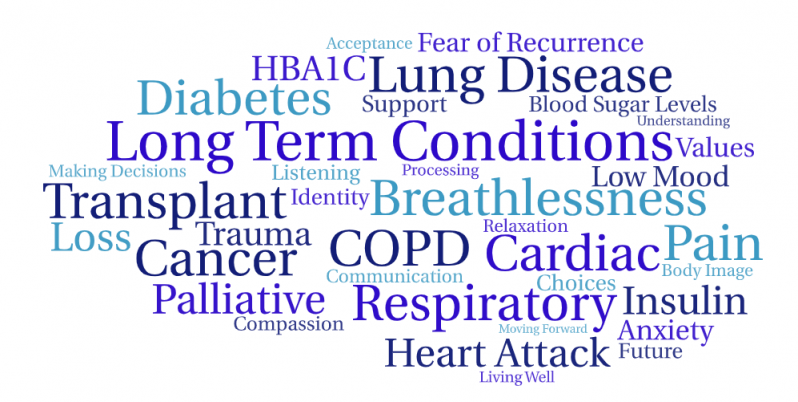South Cumbria Locality Physical Health and Rehabilitation Psychology
Referral Criteria
You can be referred if:
You live in South Cumbria
You have one or more of the following physical health conditions:
- Diabetes
- Cancer
- Heart problems
- Chronic respiratory difficulties (e.g. COPD)
- Chronic Fatigue Syndrome/ME (please click here to find out more about our CFS South Cumbria service)
Your experience of this condition has affected your mood and quality of life.
If you live in North Lancashire and have cancer or have been treated for cancer in the past and your experience of this condition is affecting your mood and quality of life you can be referred to the service by your cancer care team.
If you are a health professional and unsure and would like to discuss a case with one of our team, click here for our duty consultation contact number. You can book an appointment to speak to us for further advice (this is not for patients - potential patients should speak to their GP/health team).
Who are we and what do we do?
We are a team of Psychological Practitioners and Physiotherapists. We will work with you to improve your physical health and mood, and to lead a happier, healthier life. Click on the drop downs below to find out more about their individual roles.
What do our Psychological Practitioners do?
- They work with you to understand how your physical health affects your mood
- They may offer you 1:1 talking therapy
- They may give you information about other services that can help you
What do our Physiotherapists do?
- They help you to understand how your physical symptoms affect your overall health
- They help you to set goals around health and wellbeing and support you to achieve these
- They may give you information about other services that can help you
What to expect if you are referred to our service?
When your GP or health care team have suggested that you come to meet us, we will send you a letter telling you more about our service, and offering you an appointment. We will also send you some questionnaires to fill out about your mood and how you are coping.
- These appointments are available in Furness and South Lakeland.
- For people with cancer, these appointments are also available in North Lancashire.
- We will try to offer you an appointment somewhere close to where you live. This may be a local health centre or GP surgery.
The first appointment lasts about 50 minutes. This will give us a chance to think together about your health difficulties, your mood, your family and other important people in your life, and any life events that are challenging.
The session will be at a pace that suits you and you will not be expected to speak about anything you would prefer not to.
During the appointment, we will agree with you a plan based on what will be most helpful to you. The plan could include:
- One-to-one talking therapy, such as Cognitive Behavioural Therapy (CBT), Eye Movement Desensitisation Reprocessing (EMDR), Compassion Focused Therapy (CFT), and Acceptance and Commitment Therapy (ACT). Please click here to find out more about these different therapy types.
- One-to-One Physiotherapy appointments
- Group courses which will help you to learn different ways of managing your physical health and mood, alongside other people with similar difficulties e.g. our Living Well with and Beyond Cancer Course.
Confidentiality
Details of your sessions are put on your medical record, but you can tell us if you do not feel ok with anything being shared with your GP or other members of your care team.
We will only talk about you outside the team when you give permission, or if we think you are at risk of harm and we need to protect you or others.
We will keep your GP and/ or consultant up to date by sending letters about your appointments so they know how you are and what you are currently working on – you will also get a copy of these letters.
Why this approach?
“My difficulties are physical, how can a psychologist help me?”
We all experience stress at times, but living with a physical health condition can make everyday things more difficult and can have an effect on your quality of life. For example, you may feel anxious, sad, lonely or irritable and this might be having an effect on your relationships. It can also bring up memories or difficult feelings from the past which you thought you had dealt with.
We hope to work with you to help you to make changes which will help you to live a happier, healthier life. This will be a joint effort and we will make decisions with you, not for you - this approach is guided by information from the National Institute for Health and Care Excellence .
What do our patients say?
About 1:1 therapies:
‘This service offers a safe and valuable space to explore emotional/mental health issues’
‘It helped me to identify goals and work out areas to start to build on’
‘The help has given me has given me my life back and I am enjoying my life for the first time in the two years since my diagnosis.’
About groups and courses:
‘After being initially very sceptical and rather anxious about group sessions, I actually found it inclusive, informative and friendly. It also made me feel that I was not alone and others shared my experiences’

